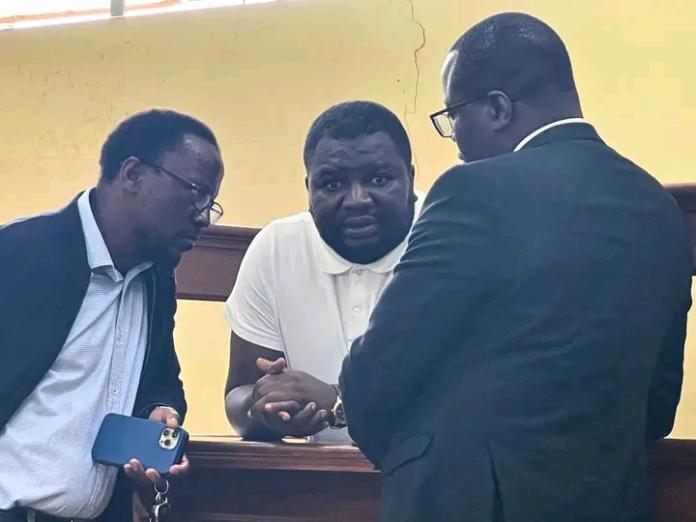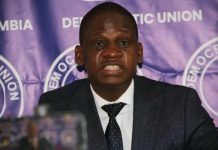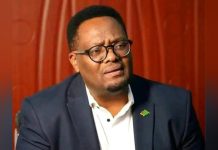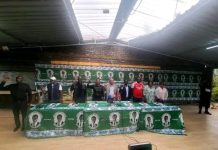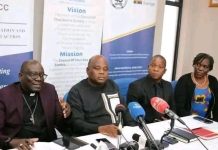Africa-Press – Zambia. Two defence witnesses took the stand today in the case involving Patriotic Front Secretary General Raphael Nakachinda, offering detailed linguistic and cultural testimony aimed at dismantling the claim that the word “ubututu” was used as a tribal insult.
The atmosphere in court was tense but focused as the defence sought to anchor one central point. A man cannot be tribal against himself. And a nation with a long history of Tonga, Bemba, Lozi, Ngoni, and Chewa leaders serving at the highest levels cannot suddenly pretend that a single word has become the new face of ethnic division.
Dr Lawrence Mwelwa, a 61 year old academic and political scientist, was the first to testify. He laid out his credentials with calm confidence. Former Vice Chancellor of Chreso University. Holder of degrees in business administration. Doctor of philosophy in political science. Author of a forensic linguistic rebuttal lodged as evidence before the court. And above all, a native Bemba speaker who has studied the word at the centre of this case with precision.
His testimony was clear. In the Bemba language, “ubututu” means ignorance. Not stupidity. Not foolishness. Not tribal contempt. He broke down the word into its semantic roots and showed how its meaning depends entirely on context. He explained that Bemba is a language known for fluidity and layered usage. A person can have “ubututu bwabaice” referring to youthful inexperience. A minister can be described as “batutu” to mean they do not understand policy. And an individual from a specific place can be criticised without that critique extending to the entire community.
His key point struck the courtroom like a hammer. When one says “ubututu bwakubweengwa” they refer to a behaviour or situation involving a single individual. But if one says “ubututu bwabenabweengwa” then they have generalised to the entire people of Bweengwa. The two expressions do not carry the same meaning. The State, he argued, has chosen to generalise what was never generalised by the speaker.
He warned the court that the analysis used to accuse Nakachinda is flawed, lacking linguistic survey, lacking cultural context, and built on an isolated incident with no academic grounding. He emphasised that in Bemba, ignorance is not an insult. It is a description of not knowing something. He even cited himself as an example, noting that he was appearing before the Magistrates Court for the first time and was therefore ignorant of court procedure. No insult could be inferred from such a fact.
The second witness was Mr Dickson Kayula Chasaya, an elder statesman of the civil service. Born in 1948, a former chairman of the Public Service Commission, a man who served from 1970 across force headquarters, national registration, home affairs, and the broadcast sector. For 55 years he has hosted the iconic radio programme “Kabusha Takolelwe Bowa” on ZNBC, making him one of Zambia’s most authoritative voices on culture, language, and oral expression.
His testimony reinforced Dr Mwelwa’s academic analysis with lived experience. Ubututu, he said, simply means not knowing. One can be educated, well travelled, even flown across the world, yet still be ignorant of certain things. It is not a word that denotes tribal contempt. It is not an insult to any grouping of people. It only becomes offensive if one chooses to twist it into something it is not.
He reminded the court that President Hakainde Hichilema was elected by the people of Zambia as an individual. Bweengwa did not send a collective president to State House. The votes that brought the Head of State into office came from across the country. Attempting to recast a critique aimed at an individual into a blanket insult against an entire region is both inaccurate and dangerous.
Both witnesses, one an academic and one a cultural elder, dismantled the narrative that this case is built upon. Their combined testimony suggests that the accusation of tribalism is being manufactured where no tribal expression exists. And that the portrayal of Tonga speaking citizens as marginalised is contradicted by history itself. Zambia has had Tonga speaking iconic leaders like Mark Chona, Vernon Mwaanga, and Elijah Mudenda who served this nation at higher levels with distinction.
The defence’s central theme therefore remains unchanged. Nakachinda could not possibly have been tribal against himself, because Zambia’s political identity has never been a one tribe club. It has always been a mosaic of cultures, voices, and leaders who rose from every part of the country. Any attempt to distort this truth should be condemned for the reverse tribalism that it is.
For More News And Analysis About Zambia Follow Africa-Press


